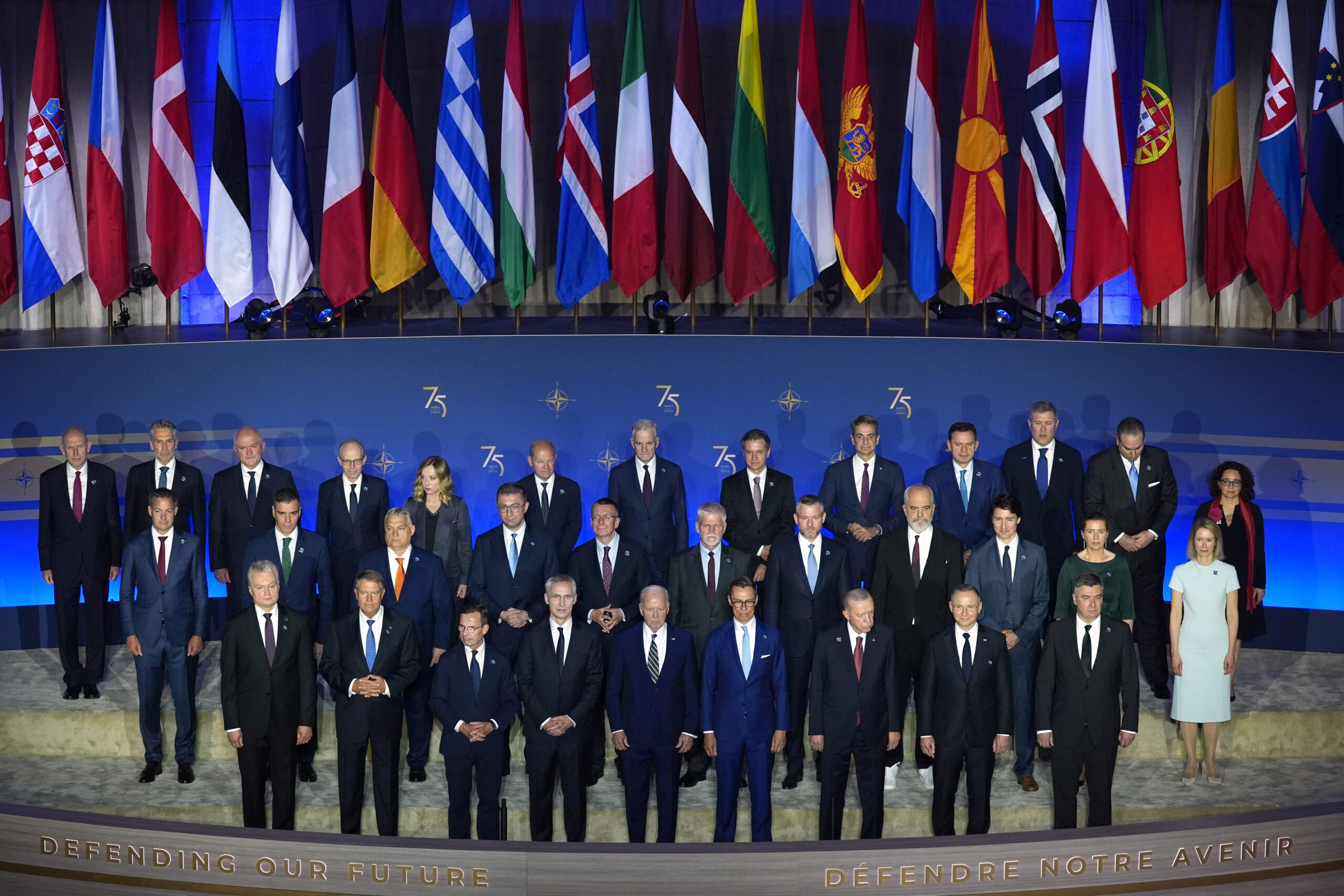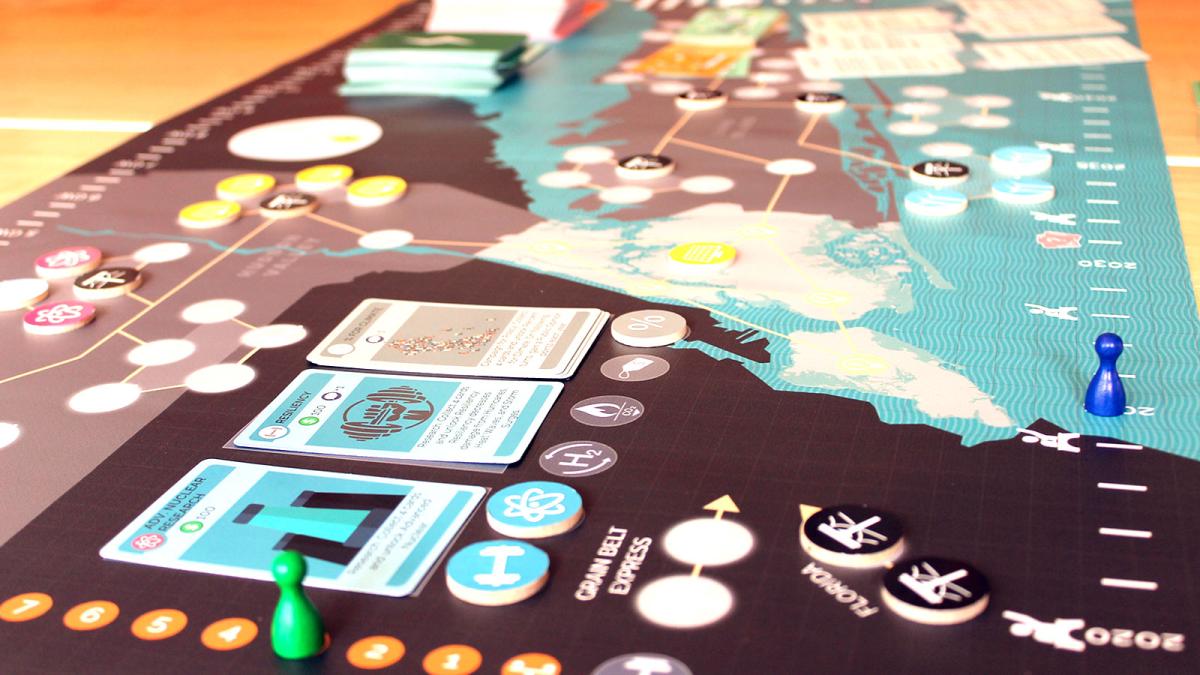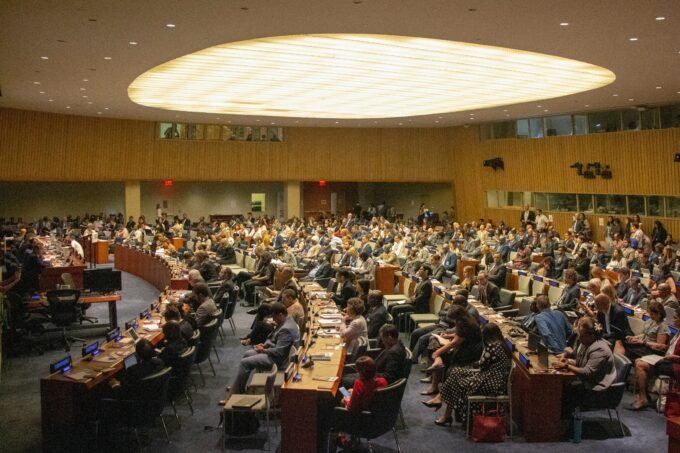This content originally appeared on The Real News Network and was authored by The Real News Network.
This post was originally published on Radio Free.
This content originally appeared on The Real News Network and was authored by The Real News Network.
This post was originally published on Radio Free.
This content originally appeared on The Real News Network and was authored by The Real News Network.
This post was originally published on Radio Free.
New York, July 11, 2024—More than 60 media and civil society organizations have signed an open letter urging Israel to give journalists independent access to Gaza.
The organizations—which include the Associated Press, Agence France-Presse, BBC, CNN, The Guardian, The New York Times, and The Washington Post—point out that no independent media access to Gaza has been permitted since the start of the war, increasing the pressure on domestic journalists, and creating a space for mis- and disinformation to flourish.
“More than 100 journalists have been killed since the start of the war and those who remain are working in conditions of extreme deprivation. The result is that information from Gaza is becoming harder and harder to obtain and that the reporting which does get through is subject to repeated questions over its veracity,” the organizations say in the letter, which was coordinated by the Committee to Protect Journalists.
The letter comes ahead of a planned visit by Israeli Prime Minister Benjamin Netanyahu to the United States, where he is set to meet with U.S. President Joe Biden and address the U.S. Congress on July 24.
CPJ CEO Jodie Ginsberg noted: “President Netanyahu describes Israel as a democracy. His actions with regard to the media tell a different story. International, Israeli, and Palestinian journalists from outside Gaza should be given independent access to Gaza so they can judge for themselves what is happening in this war—rather than being spoon-fed with a handful of organized tours by the Israeli military.”
In addition to news outlets, the signatories—who span more than 26 countries—include professional groups and organizations dedicated to defending press freedom.
About the Committee to Protect Journalists
The Committee to Protect Journalists is an independent, nonprofit organization that promotes press freedom worldwide. We defend the right of journalists to report the news safely and without fear of reprisal.
Read the full letter below
We, the undersigned, request that Israeli authorities end immediately the restrictions on foreign media entering Gaza and grant independent access to international news organizations seeking to access the territory.
Nine months into the war, international reporters are still being denied access to Gaza except for rare and escorted trips arranged by the Israeli military. This effective ban on foreign reporting has placed an impossible and unreasonable burden on local reporters to document a war through which they are living. More than 100 journalists have been killed since the start of the war and those who remain are working in conditions of extreme deprivation. The result is that information from Gaza is becoming harder and harder to obtain and that the reporting which does get through is subject to repeated questions over its veracity.
We fully understand the inherent risks in reporting from war zones. These are risks that many of our organizations have taken over decades in order to investigate, document developments as they occur, and understand the impacts of wars the world over.
A free and independent press is the cornerstone of democracy. We ask that Israel uphold its commitments to press freedom by providing foreign media with immediate, independent access to Gaza, and that Israel abides by its international obligations to protect journalists as civilians.
Signatories
This content originally appeared on Committee to Protect Journalists and was authored by Committee to Protect Journalists.
This post was originally published on Radio Free.
This content originally appeared on ProPublica and was authored by ProPublica.
This post was originally published on Radio Free.
The Punjab and Haryana High Court has stayed an order requiring journalist Rahul Pandita to pay INR7.5 million (US$89,800) in defamation compensation to senior paramilitary officer Harpreet Singh Sidhu, according to news reports. This stay will remain in effect until the next hearing, scheduled for October 21.
On March 5, an appellate court ordered Pandita, an independent journalist and author, to pay the original ask of INR5 million (US$59,900) plus 6% interest, totaling INR7.5 million, from the date of the suit’s filing. This compensation was for Sidhu’s alleged “loss of reputation and goodwill, mental agony, and hardship due to unfounded derogatory remarks.”
On May 28, the high court stayed the appellate court’s decision after it was revealed that Pandita was not even aware of the trial proceedings against him and had no opportunity to defend himself, according to CPJ’s review of the court ruling.
The order stemmed from a December 13, 2014, report by Pandita, who worked with The Hindu newspaper as an opinion and special stories editor at the time, that has since been withdrawn but was reviewed by CPJ. While it is not clear why the publication withdrew the story, The Hindu initially defended Pandita’s report in a response to Sidhu’s legal notice to the publication as fair comment, according to the Mumbai Press Club.
The report accused Sidhu of negligence in his duties as Inspector general of Central Reserve Police Force (CRPF) operations in Chhattisgarh. The original defamation suit filed by Sidhu was dismissed by a lower court in Mohali on September 16, 2017, but Sidhu challenged this judgment, leading to the appellate court’s recent decision.
The report claimed that Sidhu did not perform his duties properly during a Maoist attack on December 1, 2013, which resulted in the deaths of 14 people. Pandita alleged that Sidhu took nearly four hours to reach the location despite being only 400 meters (440 yards) away. Sidhu contested these allegations, which were summarized in a statement published by The Hindu, asserting that he was the first to reach the troops and provided proper leadership.
In his defense, Pandita’s lawyers argued that the report was not personal, did not invade Sidhu’s privacy, and was written with due care and caution, according to a news report reviewed by CPJ. They emphasized that the articles were published as part of Pandita’s journalistic duties and were based on eyewitness accounts and responses from CRPF officials.
“The articles were published in relation to the conduct of a public servant, in exercise of public duties, and thus the respondent being a public servant cannot question foul play,” Pandita’s legal team argued. Pandita also maintains that he reached out to Sidhu’s superiors for their right to reply, and that their responses were included in the story.
Pandita declined to respond to CPJ’s request for comment, and Sidhu has not yet replied to CPJ’s text message.
This content originally appeared on Committee to Protect Journalists and was authored by Committee to Protect Journalists.
This post was originally published on Radio Free.
This content originally appeared on ProPublica and was authored by ProPublica.
This post was originally published on Radio Free.
Comprehensive coverage of the day’s news with a focus on war and peace; social, environmental and economic justice.

The post NATO formally declares that Ukraine is on an “irreversible” path to membership in the Western military alliance – after its war with Russia ends – July 10, 2024 appeared first on KPFA.
This content originally appeared on KPFA – The Pacifica Evening News, Weekdays and was authored by KPFA.
This content originally appeared on The Real News Network and was authored by The Real News Network.
This post was originally published on Radio Free.

On a balmy Seattle evening in June, four climate journalists walk into a bar. I’m one of them, with a cardboard box — the reason for our gathering — tucked under one arm. Inside it is the just-released climate twist on a classic board game, Catan: New Energies.
We’re all long-standing fans of the cult favorite that it’s based on, and we’re curious about this new version of Catan, in which players balance renewable energy and fossil fuels on the fictitious island. But our true mission is to find out whether a board game about clean energy can actually be fun — and whether that might get more people talking about climate change, which scientists and advocacy organizations suggest is a precursor to climate action. We order our pints, crack open the plastic-free packaging, and begin to play.
![]()

Unboxing the New Energies game. Game pieces come wrapped in paper, rather than plastic. Grist / Sachi Kitajima Mulkey
The original game on which New Energies is based was released in 1995 as Settlers of Catan. It has sold more than 40 million copies worldwide and is available in over 40 languages. In 2015, the company dropped “settler” from the name, but the game has still drawn criticism for perpetuating a narrative of resource extraction and colonialism.
Designed for 3 to 4 players, it features a novel hexagonal map of colorful tiles, each representing a different type of land that can give the player a corresponding resource. During their turns, players can barter and swap resources to try to get what they need to build towns and roads. Throughout the couple of hours it takes to play, these negotiations can become lively, even heated — probably the only modern context in which many of us have squabbled over sheep.
Released on June 14, New Energies is the latest standalone addition in the extensive Catan universe. It was inspired by a fan-made expansion called Oil Springs, which got an official release in 2011 and added a fossil fuel mechanic to the base game.
Benjamin Teuber, son of the original designer Klaus Teuber, said that, at first, it was challenging to squeeze realistic energy and pollution dynamics into a relatively short game. To make sure they got it right, the family consulted with one of the original designers of Oil Springs, sustainability researcher Erik Assadourian.
“Like my dad always used to say, it must be fun — otherwise the best message won’t be experienced,” Teuber said. “But we have to acknowledge and to respect the fact that we have a very complex topic, such as climate change, reduced to something playable.” After over a decade of making games together, New Energies was the family’s last collaboration before Klaus passed away in 2023.
![]()

“Local footprint” scorecards, on which each player balances fossil fuels and clean energy, are a novel element in New Energies. Grist / Sachi Kitajima Mulkey
The game has company on climate-themed shelves: Titles like Daybreak, CO2: Second Chance, and Tipping Point all challenge players to take on the compounding effects of manmade planetary warming and defeat it with clean, green ingenuity.
“It’s just more evidence that people have climate change at the top of their minds now,” said Dargan Frierson, an atmospheric sciences professor at the University of Washington, who leads Earth Games, a climate game design group on campus. Even though people are often hesitant to talk about climate change — according to a 2022 report, 67 percent of Americans “rarely” or “never” discuss it with friends and family — they really want to, he said. “There’s demand for ways to think about it, deal with it, in fun ways.”
In 2022, the Environmental Game Design Playbook was released to guide creators who want to meet that demand. Daniel Fernández Galeote, a gamification researcher and playbook contributor, says that games can offer an interactive education in climate topics. “It’s experimenting with them in a safe environment, and having this sort of social contract with other people to discuss and reflect together,” he said. “Games can be very good conversation starters.”
These games and the conversations they spark could also inspire action. A 2017 paper found that playing the Catan Oil Springs expansion shifted players toward more sustainable actions. Social psychologists call this bridging the “intention-behavior” gap — what takes people from beliefs or goals to actual behavior change.
![]()
Of course, for a game to spark conversation, people need to try it first. For casual players, the setup of New Energies may be a tad overwhelming. All told, there are roughly a dozen new components, and even for my group of Catan-savvy colleagues, getting ready to play came with a steep learning curve. Thankfully, our small crew included a focused “rules guy” — an essential role for any successful game night.

A view of the New Energies board, and all its accoutrements, at the end of a game. Grist / Sachi Kitajima Mulkey
As our rules guy instructs, each turn starts by pulling an “event token” blindly from a bag, which can fill up meters on the board to trigger events like air pollution, floods, and climate conferences. In a rhythm familiar to Catan old-hats, we roll dice, collect resources, and build, while juggling new elements like energy and science.
The game starts with the assumption of a world embedded in polluting industries; it’s faster and cheaper for players to build fossil fuels than renewables. But as players build more renewable energy, they are rewarded with higher odds of “green events” and lower pollution.
Following Teuber’s belief that planetary warming should be an issue beyond politics, the game takes a stab at neutrality and avoids the words “climate change.” Instead, Kelli Schmitz, the director of brand development at Catan Studio, said the game aims to normalize renewable technologies. “It takes the controversy out of it,” she said.
Like the original Catan, players still win by being the first to collect 10 victory points, whether by fossil fuel or green energy means. “It’s important to enable people to win the game playing fossil fuels, because that is also something that is happening in the real world,” Teuber said. But it’s also possible for the game to end early with a maxed-out pollution meter, or when climate event tokens run dry. In these scenarios, the player with the lowest carbon footprint becomes the winner by default.
“The person who invested the most in green energy, we determined that person to be the natural leader,” Teuber said.
![]()
Like the majority of people, I find that the subject of climate change begets anxiety and, outside of work, I tend to avoid the subject. But as we play, the group begins to quip over the same gut-wrenching topics that are common in our newsroom. We giggle as we move around the “environmental inspector” (the new name for the resource-blocking robber of the original game), revel at the clean energy spoils of governmental funding, and cheer at the start of each climate conference event.
In the weeks since its official release, I’ve revisited the island of Catan and its “new energies” repeatedly. Each time, I’ve had to convince a group to take the journey with me — a trust fall on the promise of fun. And each time, we chatter our way to a renewable energy victory.
— Sachi Kitajima Mulkey
This isn’t Grist’s first time testing out a clean energy board game. In 2020, then-Grist staff writer Nathanael Johnson gathered a group of climate professionals to play a new cooperative board game called Energetic, developed by the nonprofit City Atlas. In the game, pictured below, players take on different roles and work together to build a clean energy supply to power New York state before 2035.

This story was originally published by Grist with the headline Can a new version of Catan, the cult-favorite board game, make climate change fun to talk about? on Jul 10, 2024.
This content originally appeared on Grist and was authored by Sachi Kitajima Mulkey.
This post was originally published on Radio Free.
This content originally appeared on Human Rights Watch and was authored by Human Rights Watch.
This post was originally published on Radio Free.
This content originally appeared on The Real News Network and was authored by The Real News Network.
This post was originally published on Radio Free.
This content originally appeared on VICE News and was authored by VICE News.
This post was originally published on Radio Free.
This content originally appeared on Democracy Now! and was authored by Democracy Now!.
This post was originally published on Radio Free.
Gaslit Nation planned to take a vacation this week, to charge up our batteries. Instead, we’re running a raw quick take on the Biden hysteria fueled by Rupert Murdoch and the New York Times (just like in 2016!) Why are so many in the media once again helping Trump come to power? Follow the money!
To our supporters at the Democracy Defender level and higher, get your questions in to us by this Thursday July 11 for our next mega-episode Q&A, which will cover the people-powered victories in the UK and French elections, as well as the far-right disinformation war on democracy here at home in the US.
Then join us this Thursday 8pm ET for a special live-taping of Gaslit Nation with cult expert Dr. Janja Lalich, the author of several books on the inner workings of cults and how to escape them, including Take Back Your Life. We’ll be discussing the MAGA cult, the weaponization of cults, and how to help a loved one who fell down a disinformation rabbit hole. A Zoom link will go out this Thursday to our subscribers at the Truth-teller level and higher at Patreon.com/Gaslit – so be sure to get your ticket by subscribing!
Thank you to everyone who supports the show – we could not make Gaslit Nation without you!
Show Notes:
Berkman Klein Center releases report on media coverage of the 2016 presidential campaign Comprehensive analysis documents how highly partisan right-wing sources helped shape mainstream press coverage prior to the election https://hls.harvard.edu/today/berkman-klein-releases-report-media-coverage-2016-presidential-campaign/
But Her Emails! Behind The New York Times’ Maddening Hillary Clinton Coverage https://www.vanityfair.com/news/2022/10/but-her-emails-behind-the-new-york-times-maddening-hillary-clinton-coverage
Epstein Accuser Sues Famed Psychiatrist for ‘Depraved’ Sexual Abuse https://www.thedailybeast.com/epstein-accuser-sues-famed-psychiatrist-henry-jarecki-for-depraved-sexual-abuse
Jeffrey Epstein’s Ex Says He Boasted About Being a Mossad Agent https://www.thedailybeast.com/jeffrey-epsteins-ex-says-he-boasted-about-being-a-mossad-agent
These Are the Men Named in the New Epstein Documents https://www.thedailybeast.com/new-jeffrey-epstein-documents-name-bill-clinton-donald-trump-david-copperfield-as-his-pals
Epstein Files on Trump’s Child Rape https://x.com/lesleyabravanel/status/1809951921903407594?t=2z5PVS_OEyy0KG4tqGiCjg&s=19
Dark Money and the Courts The Right-Wing Takeover of the Judiciary https://www.acslaw.org/analysis/reports/dark-money/
After 50 Years, This Right-Wing Law Factory Is Crazier Than Ever The American Legislative Exchange Council is where corporations and far-right groups go to buy government policy. https://prospect.org/power/2023-10-04-alec-50-years-right-wing-law-factory/
New York Times Now Claims Video Footage Is Evidence of Biden’s Decline https://www.nationalreview.com/corner/new-york-times-now-claims-video-footage-is-evidence-of-bidens-decline/
Rupert Murdoch’s New York Post spreading disinformation against Biden https://x.com/nypost/status/1801555018929123647?t=xMQ9U_XOEm_NFlAjDpBaDA&s=19
Rupert Murdoch’s Fox News spreading disinformation against Biden https://x.com/DecodingFoxNews/status/1803661752933998889?t=p8EgABfbhCTbkqLRKLnuKA&s=19
American Cassandra: The Life of Dorothy Thompson https://www.gaslitnationpod.com/episodes-transcripts-20/2023/12/27/dorothy-thompson-peter-kurth
Yellen defends global corporate minimum tax deal amid Republican criticism https://www.reuters.com/world/us/yellen-us-negotiating-rd-tax-credit-part-global-tax-deal-2024-04-30/
This content originally appeared on Gaslit Nation and was authored by Andrea Chalupa.
This post was originally published on Radio Free.

With the war on Gaza now in its 10th month, we speak with journalist Jeremy Scahill about the state of negotiations for a possible ceasefire and hostage deal between Israel and Hamas. Scahill recently spoke to senior Hamas officials about the ongoing ceasefire negotiations and the group’s broader goals. He is a co-founder of The Intercept, and he recently announced he was leaving after more than a decade to launch a new investigative journalism outlet, Drop Site News, alongside colleague Ryan Grim. Scahill’s new article, “On the Record with Hamas,” examines the militant group’s motivations to launch the October 7 attacks in Israel, as well as its stance on the negotiations, based on interviews with a number of senior Hamas officials and other sources. “October 7 didn’t happen in a vacuum,” says Scahill. “The primary motivation, Hamas members told me, was to try to shatter the status quo on Gaza. They felt that the situation was becoming untenable.”
This content originally appeared on Democracy Now! and was authored by Democracy Now!.
This post was originally published on Radio Free.

Image by Matthew TenBruggencate.
The fundamental problem we face today in world affairs is our failure to adjust our international institutions to the imperative needs of a rapidly evolving age.
The UN Secretary-General said as much last September when in a speech before the General Assembly he noted: “We cannot effectively address problems as they are if institutions don’t reflect the world as it is.”
The world has become far more complex than it was in 1945 when the current global governance system, based primarily on the UN Charter, was created.
This system of international cooperation is no longer fit for purpose. It struggles to cope with the multiple unresolved crises we face, often because it lacks the appropriate jurisdiction, adequate resources, and the conceptual framework to effectively diagnose the problems and bring about credible solutions, and because it is deemed fundamentally unfair.
And so, we move on towards a potentially catastrophic future of accelerating climate change, the continued unraveling of our nuclear order, rising and destructive nationalisms, increasing conflict, more frequent pandemics, and an economic paradigm that cannot deliver well being for all.
The UN Charter was adopted 79 years ago, on June 26, 1945. So, here’s a thought experiment: If we were to start from a completely blank page, with no prior mistakes to correct or historical context to maintain, what system of international governance would we design and how might it function?
Adaptation and reinvention are a part of the natural course of things. One can both support the UN for its achievements and acknowledge the need for its transformation. Our call to reform the UN comes from our desire to see it survive and thrive.
The Charter was always meant to be a living document. In adopting it in 1945, then U.S. President Harry Truman made this clear: “This Charter will be expanded and improved as time goes on. No one claims that it is now a final or a perfect instrument. It has not been poured into any fixed mold. Changing world conditions will require readjustments.”
The Charter’s own Articles 108 and 109 were deliberately drafted to institutionalize the possibility of its evolution over time. The main issue to be addressed by these articles from the very inception of the UN was the veto in the Security Council. This should be seriously reexamined, as recommended in a recent report of an expert body convened by the Secretary-General. But so, too, could the Charter place a greater emphasis on climate change, on which it is silent; it could articulate the rules of a World Parliament to make it more representative; it could strengthen the UN’s ability to enforce decisions; provide more predictable financing, and better engage the world’s citizens in international decision-making.
The most common argument against updating the Charter is that with today’s fraught geopolitical landscape, we risk ending up with something worse
First, there will never be a perfect time. As the saying goes, the best time to plant a tree was 20 years ago. The second-best time is now.
Second, Charter reform will take years. The mood will change in time. But we need to start the process, or at the very least, the conversation.
Third, Charter reform would address the very issues that make many nations so mistrustful, including perceived double standards in the application of international law and a global governance system that privileges the interests of a few powerful countries at the expense of others. Creating a fairer playing field would incentivize countries to engage in good faith.
And finally, yes, there are risks involved in UN Charter reform, but there are even greater risks in continuing our current path.
This is why the exercise of imagining a new start, from scratch, could be helpful. Imagination isn’t subject to a veto (Charter reform requires that all five permanent members consent to the change), nor is it bound by the current political loggerheads which can make even marginal change seem extremely difficult.
Imagination can open the door to ideas both great (such as questioning the role of state sovereignty in a world of global interdependence); and small (like requiring that the General Assembly hold a session whenever a veto is used in the Security Council).
What we must avoid, regardless of the fraught political moment and our own trepidation, is to delay conceiving of something new out of a misplaced deference to a system that is not delivering credible solutions to existential threats.
We would do well to imagine what a new Charter might look like (as some have already begun doing); what principles it would be built on, what institutions it would give rise to, and how it could inspire the world to come together in a new shared endeavor. Imagine a new Charter drawn up by a far more representative display of the world’s many cultures and governments (only 51 countries existed when the current Charter was drafted whereas there are now some 200 sovereign nation-states. Once we have dared to imagine, we may be better equipped to bring some of the necessary changes into being.
The stakes could not be higher. A new path is needed. The question is whether we craft it intentionally, as a matter of conscious choice, or whether we suffer the horrific consequences of failure to act.
The UN Charter was always meant to be a living document. Perhaps now is the time to breathe some new life into it.
The post Breathing New Life into the UN Charter appeared first on CounterPunch.org.
This content originally appeared on CounterPunch.org and was authored by Dan Perell – Heba Aly.
This post was originally published on Radio Free.
This content originally appeared on Laura Flanders & Friends and was authored by Laura Flanders & Friends.
This post was originally published on Radio Free.
This content originally appeared on Radio Free Asia and was authored by Radio Free Asia.
This post was originally published on Radio Free.
This content originally appeared on Democracy Now! and was authored by Democracy Now!.
This post was originally published on Radio Free.
This content originally appeared on Democracy Now! and was authored by Democracy Now!.
This post was originally published on Radio Free.
This content originally appeared on Democracy Now! and was authored by Democracy Now!.
This post was originally published on Radio Free.
Voters in Iran elected Masoud Pezeshkian as president Saturday. The heart surgeon and former health minister defeated hard-liner Saeed Jalili in a runoff vote held just weeks after President Ebrahim Raisi and other top officials died in a helicopter crash. Pezeshkian has criticized Iran’s mandatory hijab law for women and has promised to disband Iran’s morality police, as well as better relations with the United States and other Western countries in the hopes of lifting sanctions. Journalist Reza Sayah in Tehran says that while Pezeshkian spoke the language of the reformist movement, he also strived to show “he’s not going to be a disruptive force to the establishment.” We also speak with Persepolis author Marjane Satrapi, who says “elections in Iran are a farce” and that no candidate who reaches the presidency can really challenge the system. “The president does not change a lot.”
This content originally appeared on Democracy Now! and was authored by Democracy Now!.

A leftist coalition pulled off a surprise victory in the second round of parliamentary elections in France on Sunday, becoming the largest bloc in Parliament and successfully keeping the far-right National Rally party of Marine Le Pen out of government. The New Popular Front, which won 182 seats in the National Assembly, still fell short of the 289 seats required for an absolute majority. President Emmanuel Macron’s centrist coalition came second with 163 seats, while the National Rally and its allies won 143 seats after having led the first round of voting a week earlier. We go to Paris to speak with author and filmmaker Marjane Satrapi and journalist Rokhaya Diallo about the historic election result.
This content originally appeared on Democracy Now! and was authored by Democracy Now!.
This post was originally published on Radio Free.
This content originally appeared on The Grayzone and was authored by The Grayzone.
This post was originally published on Radio Free.
Ralph welcomes Washington Post reporter Shannon Osaka to discuss her new article, “The Plastics We Breathe” and the shocking truth that all of the plastic we’re using isn’t just polluting the environment—it’s polluting our bodies as well. Then, Ralph checks in on the state of the industrial hemp movements with “Hempster” filmmaker and activist Michael Henning.
Shannon Osaka is a climate reporter covering policy, culture, and science for the Washington Post. Before joining the Post, she was a climate reporter at the nonprofit environmental outlet Grist.
Microplastics are not only around us, they’re also inside us…This is a really difficult problem, and it’s partly because there is no one microplastic. Microplastics are made of a whole bunch of different materials—they’re made with different chemical additives. So scientists have found that microplastics can have certain effects in the laboratory—they can cause cell death, they can cause tissue damage, they can cause allergic reactions, they are starting to put the pieces together on the impact on human health.
Shannon Osaka
[“The Plastics We Breathe” by Shannon Osaka and Simon Ducroquet] comes across as a massive global assault—hour by hour, a violent, violent pandemic—when you look at the fact that it’s everywhere, it’s in the water, it’s in the air, it’s in human bodies, it’s in the animals that are eaten, it’s in the pipes, it’s being swallowed regularly, it’s invisible, it doesn’t produce immediate pain, it’s in the placenta, the liver, the breast milk.
Ralph Nader
Michael Henning is a filmmaker, public speaker, and longtime proponent of the Industrial Hemp Movement. He is the director of Hempsters: Plant the Seeds, a documentary about the struggle to legalize industrial hemp.
The DEA is the most profitable hemp farmer in the world. They get a million dollars per acre. Here’s the irony of all this—they’re cutting down feral ditch weed…Well, why the hell are they eradicating cannabis when it’s legal to grow in all 50 states? They’re taking us to the cleaners with the amount of money that taxpayers pay to support the Cannabis Eradication Program. How can you have a Cannabis Eradication Program when it’s legal to grow in all 50 states?
Michael Henning
In Case You Haven’t Heard with Francesco DeSantisNews 7/3/24
1. Following President Biden’s disastrous performance in the first presidential debate, pressure is beginning to build for Biden to step aside as the Democratic nominee against Trump. The Texas Tribune reports Congressman Lloyd Doggett, a Democrat representing Austin, Texas is the first to explicitly call for Biden to stand down, writing in a statement, “President Biden…has the opportunity to encourage a new generation of leaders from whom a nominee can be chosen to unite our country though an open, democratic process….I am hopeful that he will make the painful and difficult decision to withdraw. I respectfully call on him to do so.” Other top Democrats have not gone quite so far, but haven’t closed the door completely. Congressman Jim Clyburn, a powerful South Carolina Democrat and co-chair of Biden’s campaign, told MSNBC’s Andrea Mitchell “I will support…[Vice President Kamala Harris if President Joe Biden]…were to step aside,” per NBC’s Gary Grumbach. NBC reports House Speaker Emerita Nancy Pelosi said Biden’s mental fitness is a “legitimate question.”
2. Israel’s rabidly right-wing Minister of National Security Itamar Ben Gvir has issued a statement on Twitter responding to claims from Palestinian prisoners that they faced “rape, physical and psychological torture, deprivation of food, medicine and sleep, humiliation and degradation,” in Israeli prisons, per the Middle East Eye. In this statement, Ben Gvir wrote “Everything published about the abominable conditions…was true…I have already proposed a much simpler solution…enacting the death penalty.”
3. +972 Magazine is out with a report on the Sde Teiman detention center in the Negev desert, where Israel has held more than 4,000 Palestinian prisoners since October 7th. The magazine report recounts the countless instances of horrific abuse at the detention center, many perpetrated against Arab-Israeli citizens. The magazine also cites the New York Times report that “doctors at the facility were instructed not to write their names on official documents or address each other by name in the presence of patients, for fear of being later identified and charged with war crimes at the International Criminal Court.”
4. CNN reports that the Israeli military has “issued new evacuation orders…for areas in southern Gaza, including eastern Khan Younis and Rafah….[forcing] residents, many already displaced, to find new shelter,” in advance of yet another ground invasion. The Gaza European Hospital, one of the last hospitals in Gaza, is located within this evacuation zone. While the IDF has said the evacuation order “does not apply to the patients in the European Hospital or the medical staff working there,” the hospital has already “transferred patients, including those in intensive care and babies in incubators…to other facilities ‘in fear of bloodshed,’ according to the hospital’s deputy director and doctors.” The Palestine Red Crescent Society reported earlier this week that the few remaining hospitals in Gaza are overwhelmed by the influx of patients from the European Hospital, as well as other hospitals that have been bombed or evacuated during the Israeli bombing campaign.
5. Axios reports that even pro-Israel Democrats are expressing apprehension about what they describe as AIPAC’s “overkill” in the recent campaign to defeat progressive Congressman Jamaal Bowman. AIPAC, via their United Democracy Project PAC, spent at least $14.5 million on anti-Bowman ads as of June 20th, making this the most expensive primary ever, per POLITICO. One House Democrat, speaking anonymously, expressed concern that “that much money could backfire,” with another noting that “They do that a lot.” Progressive House Democrat Greg Casar said “[Progressives] have to adapt…voters have to know that, if they’re seeing a huge barrage of ads, they’ve got to…find out if those [millions] of dollars are telling [them] the truth.”
6. The Department of Justice will formally charge Boeing with fraud over its fatal 2019 crashes, per Reuters. However, the Justice Department will offer the company a plea deal, including “a financial penalty and imposition of an independent monitor to audit the company’s safety and compliance practices for three years.” If Boeing does not take the deal and plead guilty, the Justice Department has vowed to take the company to court; if they do plead guilty, it could affect the company’s ability to enter into government contracts. Companies with felony convictions are barred from being awarded such contracts, but can receive waivers. The Department “declined to comment on the families’ reaction.”
7. AP reports “Tesla is recalling its…Cybertruck pickup…to fix problems with trim pieces that can come loose and front windshield wipers that can fail.” This is the fourth recall of the Cybertruck since it went on sale late last November. Each recall affects over 11,000 vehicles, each of which cost between $80-100,000.
8. Last week, the Supreme Court ruled in Grant’s Pass v. Johnson that a local ordinance banning homeless people from sleeping outdoors – even when there is inadequate shelter space available – does not violate the Eighth Amendment’s prohibition on cruel and unusual punishment. Within days, lawmakers in Oregon and Los Angeles, among others, began to publicly signal they would utilize this ruling to crack down on unhoused people. The National Alliance to End Homelessness reports nearly 600,000 Americans are experiencing homelessness, an increase of six percent since 2017.
9. France is facing a political crisis. In the first round of legislative elections, the far-Right National Rally and its allies claimed first place with just over 33% of the vote, followed by the Leftist New Popular Front with 28%. The centrist allies of President Macron came in a distant third. Going into the second round of voting, uncertainty swirled over whether the Center and the Left could form a so-called “republican front” against the far-Right, specifically whether the centrist candidates would stand down in close run-offs between the Left and far-Right, and vice versa. Macron now seems to have endorsed this position. According to Reuters, “A survey…showed a small majority of those who voted mainstream conservative in the first round would back the left-wing candidate best placed to beat an RN rival in the second round.”
10. Finally, Kenya is being rocked by its own political crisis – one of neoliberalism. In order to meet targets set by the International Monetary Fund, Kenyan President William Ruto pushed a bill that would have imposed new taxes on “bread, vegetable oil…sugar, mobile-money transfers and some imports,” per Reuters. This announcement led to nothing short of a popular uprising in the streets, leading to violent clashes as the police sought to quash these protests. Those clashes left at least two dozen protesters dead. President Ruto has now pulled the bill, but protests continue to rock the country. One protester told Reuters “People are dying in the streets and the only thing he can talk about is money. We are not money. We are people. We are human beings…He needs to care about his people, because if he can’t care about his people then we don’t need him in that chair.”
This has been Francesco DeSantis, with In Case You Haven’t Heard.
This content originally appeared on Ralph Nader Radio Hour and was authored by Ralph Nader.
This post was originally published on Radio Free.
Born into a wealthy, elite North Korean family, the siblings fled 10 years ago with their parents.
In May, they graduated from Columbia University, among the very few North Korean escapees to do so.
Along the way, Lee Hyunseung, 38, and his sister Seohyun, 32, have had to adjust to a wholly different culture and to a more ordinary lifestyle – earning money at part-time jobs, buying groceries, watching movies with friends and experiencing freedom – something they’re still not completely used to.
“For the first three years after escaping from North Korea, I was more focused on settling down and dealing with various overlapping situations rather than truly feeling free,” said Hyunseung. “I’ve been learning the concept of freedom as I engage with society and receive education.”
As a college student, he was impressed by the ease with which his classmates expressed themselves and even gathered to protest – freedoms they seem to take for granted, but still seemed extraordinary to him.
In late April, he felt envious as he witnessed demonstrations materialize on Columbia’s campus against Israel’s military strikes on Gaza.
“The fact that the United States truly respects freedom of expression strikes a chord in my heart,” he said. “In North Korea or China, it’s unimaginable to even think about such things.”
But when the protests turned violent and the demonstrators occupied buildings on the campus, he felt they had gone too far. “This freedom of expression has gone beyond freedom and is causing discomfort to other students,” he said.
‘One-percenters’
Hyunseung and his sister were born into a privileged family in North Korea – the so-called “one-percenters” who lived at the top of the country’s economic pyramid, far above the masses who often struggled to make ends meet.

Their father, Ri Jong Ho, was a senior economic official who served under all three generations of the Kim Dynasty – national founder Kim Il Sung, his son Kim Jong Il and his son Kim Jong Un, the current supreme leader.
Stationed in Dalian, China, Ri led a trading corporation under the control of Office 39, a clandestine group formed in the 1970s to manage slush funds for the North Korean leader.
Hyunseung and Seohyun went to an international school in Dalian, where they learned English as well as Mandarin.
In 2014, the family saw many members of the upper echelons being arrested or suddenly disappearing in the wake of Kim Jong Un’s purge and execution of his uncle Jang Song-thaek.
Fearing that they could be next, Ri decided to defect. The four family members drove to a local park in Dalian, left their phones in the car and discreetly discussed their escape plans.

“I couldn’t even dream of escaping,” said Hyunseong, 28 at the time. “I wanted to go to America, but I was at a loss because I didn’t know how to get there.”
They left China in late 2014 for South Korea in what Seohyun described as “a whirlwind” or “a dream” – but declined to describe the details for various personal reasons.
“It was hard to believe that this was actually happening to us,” she said. “It was incredibly tense. We didn’t know who might appear or who might attack us.”
The family landed in South Korea, which readily welcomes escapees, thinking they would be safe there. But they said they were spied on and targeted in hacking attacks by North Korea.
Two years after their escape, the North Korean propaganda website Uriminzokkiri ran a hit piece on Ri featuring his mother and siblings publicly denouncing him and demanding that the family return.

The family took it as a message of intimidation from the North Korean authorities, who are known to punish family members for the actions of its citizens living abroad.
So in 2016, the family left for the United States to seek asylum.
Friends with former enemies
At Columbia, one of Hyunseung’s friends was a member of the U.S. military – an enemy during his previous life in North Korea, where he was required to serve time in the army.
“He is one of my best friends,” said James Brown, an intelligence officer in the U.S. Marine Corps, one of a group of friends meeting at a bar near Columbia after class.
“We have a great relationship. But at one point in time, I’m South of DMZ and he is North of it,” he said. “We were probably doing exercises against each other, so it’s kind of funny.”
The next evening, both Hyunseung and his sister attended a screening of “Beyond Utopia,” a documentary about escape journeys of several North Korean families.

The event was hosted by Korea Focus, a student group affiliated to the university, and Seohyun helped to organize it. “As a student who escaped North Korea, I feel it is my duty to spread awareness,” she said.
Later, while walking through bustling Times Square in the rain, Seohyun reflected on how her journey has contrasted with so many of her compatriots.
“There are many smart and talented individuals in North Korea,” she said. “However, it’s heartbreaking that they live like tools and slaves to the regime, without even the opportunity to realize their own talents.”
Walking with her, Hyunseung said that “when you don’t have freedom, you don’t even realize whether you have it or not. But once you experience freedom, you’ll do everything in your power to never lose it. It becomes more precious.”
Hyunseung often visits a Korean supermarket near the Columbia campus, and is struck by how expensive food has become.
“Prices are quite high here, so it’s hard to decide when shopping for groceries,” he said while perusing the produce aisle with two RFA reporters.
He looks at some expensively priced meat. “I wonder if there are any sales going on?” he wonders out loud.

The total for his groceries quickly climbs above $50, and after another comment about high prices he invites the reporters into his apartment for a meal.
In his tiny kitchen, he chopped vegetables, added spices to a broth on the stove and fried meat. About 40 minutes later, the food was ready to eat – North Korean-style dubu kimchi-jjigae (kimchi stew with tofu) and South Korean-style Dwaeji-kalbi (pork spare ribs).
Pyonghattan
Though Hyungseung is not hurting for money, his living situation, in which he shares a small apartment with two roommates, is a far cry from the life he was born into.
In 2016, the Washington Post introduced Hyunseung’s family as part of North Korea’s top 1%, saying that when they lived in Pyongyang, they enjoyed a standard of life similar to that of wealthy Manhattan residents.
The report described the lifestyle of young rich Pyongyangers: working out just to be seen, meeting friends in trendy coffee shops for a chat over overpriced cappuccino and going overseas for shopping trips.
The official salary in North Korea at the time was $10 per month, according to the report, but at one of the restaurants frequented by the 1%, a steak with a baked potato costs almost five times as much.

They were living the good life in their insulated elite-class bubble, which the Post described as ‘Pyonghattan.’
When they fled to South Korea, their mother was worried that they had become used to having so many advantages in North Korea that they might not be able to adapt.
“My wife was worried about how we would survive in a capitalist society without money,” their father, Ri Jong Ho, told RFA Korean. “But the kids reassured her, saying, ‘We will go and earn money, so don’t worry about that.’”
It has now been eight years since the family moved to the United States, and their life here has been anything but luxurious. Gone are the days where they could spend money freely. Instead they know the struggles of life as immigrants.
“I worked as a waiter at a ramen restaurant and a valet parking attendant,” Hyunseung said. “I made a mistake while working in the parking lot. A customer got angry with me and he called me ‘some Chinese guy’” – not realizing until later that he was subjected to discrimination.

His sister Seohyun is now used to living in New York, and blends in with everyone around her. Ironic considering that when she was in North Korea, she had not even heard of “the city.”
“I had no idea at all,” she said. “We learned about countries and their capitals back in North Korea, so I knew about Washington D.C., but I hadn’t heard of New York specifically.”
At first, she was afraid of going out at night, but now it doesn’t bother her at all.
Hyunseung sits in front of the Alma Mater statue on the steps in front of Low Library, pondering his place in the city.
“I haven’t really thought of myself as a New Yorker yet,” he said. “So I guess I’d say I’m more of a Pyongyang-New Yorker,” he said, with a chuckle.
Translated by Claire S. Lee and Leejin J. Chung. Edited by Eugene Whong.
This content originally appeared on Radio Free Asia and was authored by By Park Jaewoo and Jamin Anderson for RFA Korean.
This post was originally published on Radio Free.